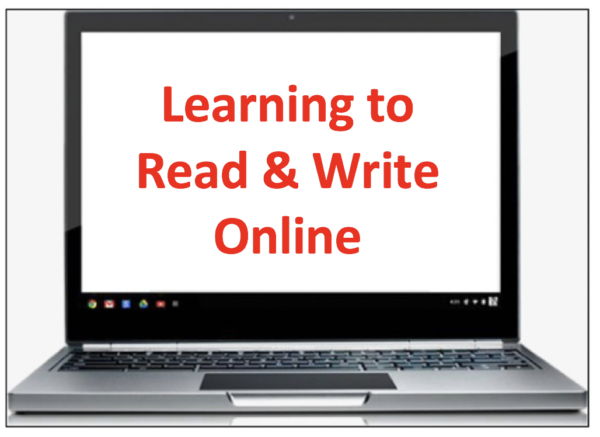Teaching Literacy Skills Virtually

During this unprecedented 2020 to 2021 school year, educators, students and parents across the country are struggling to adjust to ever-changing instructional models that combine in-person teaching, virtual online instruction, and asynchronous online learning. The numbers of students prior to the pandemic who had difficulty developing grade-level reading and writing skills was already too high, and the disruption to teaching and learning will only make things worse. Reading and writing skills are the foundation of all learning, so we must do the best we can to teach students of all grades the literacy skills they will need to be able to access the content in all subjects that they are missing because of the Covid-19 pandemic.
I have met and heard about so many dedicated literacy educators and organizations who are meeting the challenge by developing resources to teach literacy skills virtually. This month’s post will focus on virtual literacy teaching to coincide with the launch of a new collection of resources for teaching reading and writing virtually that Keys to Literacy is curating. The collection can be accessed at a new Padlet titled “Resources: Teaching Literacy Virtually.” We have only just begun the collection, so check back often to find new additions!
To begin, I want to highlight some of the free resources that Keys to Literacy is offering to help teachers provide virtual instruction of Keys to Literacy strategies. The first way we are doing this is through a fall series of seven, 30-minute free webinars. During these webinars, Keys to Literacy staff Lisa Klein and Colleen Yasenchock provide practical, hands-on suggestions for teaching skills from The Key Comprehension Routine, The Key Vocabulary Routine, and Keys to Beginning Reading professional development programs. Even if you have not participated in Keys training, you will learn some helpful instructional practices! Each session is recorded and archived, along with the PowerPoints and handout materials. View the list below of topics and dates. As of this posting, there are still three more scheduled that you can attend live! Click here to access archived webinars/materials.
- Key Vocabulary: Previewing Vocabulary Virtually (October 8)
- Key Comprehension: Virtual Categorizing & Top-Down Topic Webs (October 15)
- Keys to Beginning Reading: Virtual Activities to Support Beginning Reading Instruction (October 22)
- Key Vocabulary: Word Parts & Context Clues in the Virtual Classroom (October 29)
- Key Vocabulary: Virtual Word Walls & Promoting Word Consciousness (November 12)
- Key Comprehension: Virtual Annotating for Text Structure & Main Idea (November 19)
- Key Comprehension: Supporting Virtual Note Taking Using Paraphrasing (December 10)
The second resource we have been building is a free collection of Google suite and PDF files that teachers can use for virtual-live and asynchronous teaching of Keys to Literacy reading and writing strategies. Some of the items are listed below and we are adding to the collection on an ongoing basis. Visit the Padlet to access these resources.
- From The Key Comprehension Routine:
- Google docs, slides, and sheets for copying and modifying: 3 Top-Down Topic Web templates, 2 versions of Two-Column Notes, Summary template
- PDF’s to share with students: paragraph templates, Finding the Main Idea techniques poster, Two-Column Note page, How to Write a Summary, Transition word list, Bloom’s taxonomy
- From The Key Vocabulary Routine:
- Google docs, slides, and sheets for copying and modifying: Preview Vocabulary Rating Checklists, Semantic Feature Analysis template, Scaling template, Frayer/Four Square template, Concept Definition Map template, Two-Column for Vocabulary template
- PDF’s to share with students: Prefix, Roots and Suffix lists
The third resource we have been building is a list of resources for teaching beginning reading skills to young students in early elementary grades. These resources offer tools for teaching virtually many of the instructional practices that are part of our Keys to Beginning Reading 32-hour course that provides training for teaching all components of reading. Some we have curated from other sources, and some we have created. Visit the Padlet to access the collection that includes online activities for:
phoneme articulation, word and syllable awareness, phonemic awareness (e.g., Elkonin Boxes, Say It Move It), interactive alphabet arcs, letter-sound correspondence online activities, animated blending, literacy games that focus on word building and phonics skills, syllabication of “bit” words, online activities for sight words, resources for online decodable text, fluency read along app, and online text sets for building vocabulary
OTHER RESOURCES
Edutopia published a helpful blog post “Adapting Reading Comprehension Instruction to Virtual Learning” that offers some excellent suggestions. Click here.
The International Dyslexia Association sponsored several free webinars over the past several months to support virtual instruction of literacy skills. In particular, I found the following titles helpful. Click here to access them at the IDA website.
- Innovative Ways to Teach Online Part II, presented by Jilly Darefsky and Simon Kanter
- Bring Online Structured Literacy to Life with Research-Based, Engaging Activities, presented by Marianne and Keith Nice
Another resource that provides suggestions for virtual teaching of literacy skills is the Pathways to Practice webinar series that covers these topics: Vocabulary, Language Structure, Inferencing, and Text Structure. Click here to access the free archived webinars.

 Joan Sedita is the founder of Keys to Literacy and author of the Keys to Literacy professional development programs. She is an experienced educator, nationally recognized speaker and teacher trainer. She has worked for over 35 years in the literacy education field and has presented to thousands of teachers and related professionals at schools, colleges, clinics, and professional conferences.
Joan Sedita is the founder of Keys to Literacy and author of the Keys to Literacy professional development programs. She is an experienced educator, nationally recognized speaker and teacher trainer. She has worked for over 35 years in the literacy education field and has presented to thousands of teachers and related professionals at schools, colleges, clinics, and professional conferences.
Adapting to remote learning is pretty hard, and support resources are something we rely on a lot right now. Thanks for the helpful links! I’m very concerned about developing writing skills specifically. It’s very hard to monitor the process and give students meaningful feedback remotely.
I really enjoyed the post from Edutopia, it’s informative.